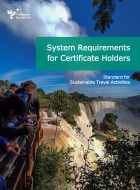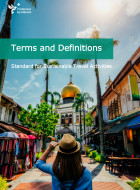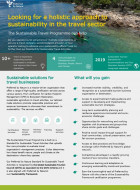The Preferred by Nature Standard for Sustainable Travel Activities has been updated and redesigned to align with the Preferred by Nature Sustainability Framework while maintaining its alignment with the Global Sustainable Tourism Council (GSTC) Criteria.
The Standard now includes a series of core requirements that encourage sustainable management and practices that positively impact people, nature and the climate.
With the implementation of the new Standard for Sustainable Travel Activities, we seek to achieve the following objectives:
- Encourage tourism organisations to make sustainability a core part of their business philosophy, management system and commercial strategies, so they can improve their position and reputation in responsible travel markets.
- Protect the social wellbeing, development and human rights of people and communities involved in tourism activities by ensuring fair, equal and legal labour practices are implemented, as well as relations that enhance and strengthen their economic activities and livelihoods.
- Ensure that tourism activities are carried out with respect and appreciation of all cultural expressions while emphasising the importance of preserving tangible and intangible cultural heritage.
- Preserve the environment and ecosystems in tourist destinations by implementing management systems and practices that protect their integrity and biodiversity, promote the rational use of natural resources, and mitigate negative impacts.
- Recognise certified tourism organisations for their true commitment and genuine efforts to reduce and offset GHG emissions caused by their operations – mitigating the negative impacts of the travel and tourism sector that aggravate climate change.
The Standard is designed to be applicable to any tourism organisation or activity seeking to evaluate, measure and improve its sustainability performance, regardless of their size or type of activity. This includes Accommodations, Tour Operators, Tourist centres or attractions and Multisite organisations and/or groups.
>> Explore the Standard and related documents below.
Get started
If found in conformity with the applicable criteria, a Preferred by Nature Certificate for Sustainable Travel Activities is issued to eligible tourism organisations for five years.
To maintain the certificate, certified tourism organisations must go through mandatory annual surveillance audits and at the end of the certification period, a voluntary reassessment is required to renew the certificate.
Annual audits ensure adherence to the standard's principles and occur within 60 days before the certificate's anniversary date.
During each annual audit, the organisation's Sustainability Management System and practices will be evaluated to ensure they maintain compliance with the four principles of this standard:
- Management and business practices are responsible
- People's wellbeing and human rights are respected
- Nature and the environment are protected
- Climate impacts are reduced and mitigated
Reassessment audits to renew the certification will evaluate all standard requirements in full.
Your options
The following requirements are available and also applicable to tourism organisations seeking certification against this standard:
- STP-02 System requirements: These are essential requirements for sustainable management systems that must be met during evaluation for certification.
- STP-03 Terms & definitions: Definitions of technical terms used in the standard to clarify interpretation of requirements. They are normative when interpreting standard indicators.




